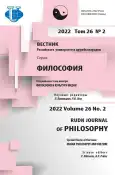Exclusivism, Inclusivism or Gradualism? Udayana and the Plurality of World-Outlooks
- Authors: Shokhin V.K.1
-
Affiliations:
- Рeoples’ Friendship University of Russia (RUDN University)
- Issue: Vol 26, No 2 (2022): INDIAN PHILOSOPHY AND CULTURE
- Pages: 245-258
- Section: INDIAN PHILOSOPHY AND CULTURE
- URL: https://journal-vniispk.ru/2313-2302/article/view/325322
- DOI: https://doi.org/10.22363/2313-2302-2022-26-2-245-258
- ID: 325322
Cite item
Full Text
Abstract
It is an issue of already longstanding significance in philosophy of religion after John Hick, that is of differing models of religious consciousness, in the frame of interreligious relations which is tackled in the paper but it is done on the basis of the texts of a concrete philosopher and the narratives around his figure. One of the most eminent Naiyayikas, Udayana (11th C.A.D.), is singled out, as the author of the very renown composition in verse Nyāyakusumaňjali offering arguments for the existence of God (Īśvara) in the framework of polemics with the anti-theistic schools and the anti-Buddhist fundamental compendium Ātmatattvaviveka, along with the stories about his very resolute and victorious struggle against Buddhism in the epoch of the latter’s final extirpation from India. The author comes to conclusion that the features of exclusivism, inclusivism and gradualism are detected in his texts and traditions around him and, therefore, any univocal authentication of his attitude to otherwise-minded and those of other faiths is impossible. While participating in the supplantation of Buddhism from India, Udayana displays very resolute exclusivism. When he addresses the educated audience sermonizing his philosophical theism, he uses purely inclusivistic strategy of uncovering implicit knowledge of Īśvara even with those very far removed from the truth. And when he attempts to locate Nyāya on the map of philosophical world-views he uses gradualism (along with implicit inclusivism) as “philosophy of ascent” of the truth from lower to higher levels. As is impossible as well to mark out of his attitudes the so-called pluralism (the conception of equivalency of religions) considered by Hick as fundamental advantage of Eastern religions over the Western ones. Comparativistic parallels along with differences (Calvin’s conception of “the seed of religion”, Rahner’s conception of anonyme Christians and Hegel’s gradualism are taken into account) and some specification of the main categories of interreligious relations are also offered in the paper.
About the authors
Vladimir K. Shokhin
Рeoples’ Friendship University of Russia (RUDN University)
Author for correspondence.
Email: vladshokhin@yandex.ru
ORCID iD: 0000-0002-2111-8740
Doctor of Sciences in Philosophy, Professor, RAS Institute of Philosophy; Purushottama Research Centre (RUDN-University)
6, Miklukho-Maklaya str., Moscow, 117198, Russian FederationReferences
- Shokhin VK. Moonlight Sankhya. Ishvarakrishna. Gaudapada. Vachaspati Mishra. Moscow: Ladomir; 1995. (In Russian).
- Shakhnovich MM. Diagoras of Melos. In: Ancient philosophy. Encyclopedic dictionary. Moscow; 2008. P. 318—319. (In Russian).
- Shokhin VK. The Buddhist Pantheon in Formation (According to “Digha Nikaya”). Folklore and Mythology of the East in Comparative Typological Coverage. Moscow; 1999. P. 59—88. (In Russian).
- Shokhin VK. The Basic Categories of Interreligious Consciousness: from Pretended Self-Evidence to Scrutiny. Christian Reading. 2018;(3):183—191. (In Russian).
- Coward H. Pluralism: Challenge to World Religion. Delhi: Sri Satguru Publications;1985.
- Encyclopedia of Indian Philosophies. Vol. II. Indian Metaphysics and Epistemology: The Tradition of Nyāya-Vaiśeşika up to Gaňgeśa. Ed. by KH Potter. Delhi: Motilal Banarsidass; 1977.
- Glasenapp H von. Madhvas Philosophie des Vishnu-Glaubens. Mit einer Einleitung über Mdhva und seine Schule. Bonn: Schroeder; 1923. (In German).
- Hacker P. “Inklusivismus”. In: Inklusivismus. Eine indische Denkform. Herausg. von G Oberhammer. Vienna: Nobili Research Library. S. 11—28. (In German).
- Hacker P. Religiöse Toleranz und Intoleranz im Hinduismus. In: Saeculum. 1957. Bd. 8. S. 167—179. (In German).
- Hick J. An Interpretation of Religion: Human Responses to the Transcendent. New Haven: Yale University Press; 1989.
- Krewitt U. Allegorese ausserchristlicher Texte II. In: Theologische Realenzyklopädie. Hrsg. von G. Krause und G. Müller. Bd. II. Berlin — New York: Walter de Gruyter; 1978. S. 284—290. (In German).
- The Nyāyakusumaňjali of Šrī Udayanācharya with the Sanskrit Commentary of Šrī Haridas Bhāţţācharya ed. by Ācharya V.S. Širomaņi. Varanasi-1; 1962.
- Radhakrishnan S. Indian Philosophy. Vol. II. New York — London: MacMillan-Akken and Unwin; 1958.
- Sharma A. A Hindu Perspective on the Philosophy of Religion. London: Palgrave Macmillan; 1990.
Supplementary files









